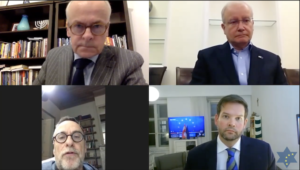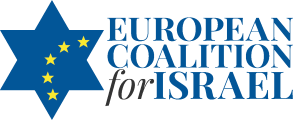 Brussels, December 3rd, 2020 – As a major transition of power in the White House is expected to take place in the USA in the coming months, the European Coalition for Israel (ECI) hosted an online webinar on Wednesday to explore what lies ahead for transatlantic cooperation in the Middle East.
Brussels, December 3rd, 2020 – As a major transition of power in the White House is expected to take place in the USA in the coming months, the European Coalition for Israel (ECI) hosted an online webinar on Wednesday to explore what lies ahead for transatlantic cooperation in the Middle East.
“The EU should support the current process of rapprochement between former enemies in the region whilst doing its utmost to oppose those forces, governments and military groups, which seek the destruction of the Jewish state”, said ECI Founding Director Tomas Sandell as he made reference to the Iranian regime in Tehran and its terrorist proxies in the region which have repeatedly threatened Israel with annihilation.
In his remarks Managing Director Fernando Gentilini from the European External Action Service (EEAS), the foreign policy arm of the EU, welcomed the normalization process in the region, and especially the Abraham Accords, where former enemies leave their differences behind and decide to cooperate. “This can have an important ripple effect in the region which could lead to more diplomatic breakthroughs”, he said. Having indirectly praised the Trump administration for its historic achievement, he maintained that the EU has had major policy differences with the Trump administration in its approach to the Israeli-Palestinian conflict in that EU continues to seek a two-state solution, based on what it considers to be internationally accepted principles, and this includes the division of Jerusalem as the capital of both the state of Israel and a new Palestinian state. But he remained optimistic in his outlook as he mentioned that the EU-Israel Association Council meetings, which have been suspended for the last eight years due to what some countries see as a lack of progress in the peace process, could soon be resumed.
Israeli Ambassador to the EU, Ron Leshno-Yaar, noted that the Middle East has changed dramatically in the last four years. He considered that these changes have occurred as a response to major transitions in leadership, technology and global challenges. “The giants of the past generations are no longer with us but replaced by a new generation of leaders. But equally important are the changes driven by technology as former enemies see the benefit of closer cooperation”, he said. He praised the partnership between Israel and the US which will remain steadfast, irrespective of which party is in the White House or is in control of the US Congress at any given time.
MEP Lukas Mandl from Austria agreed that there is both a major momentum for change and normalisation in the region as well as a transition. “In this new era, Europe needs to be reminded about the fact that Israel is our natural ally in the region with shared values and shared interests. Europe should be grateful for Israel for being a major security provider not only for the Middle East region but even for Europe and the world at large”, he said. Commenting on a change of power in the White House, he noted that, whereas he agreed up to 95% with the Middle East policies of the Trump administration, he thought that a new administration may improve the prospects for building a stronger transatlantic partnership within the Middle East.
However, both Mandl and Leshno-Yaar warned that, while Europe is more or less absent in the Middle East, this does not mean that there will be a power vacuum in the region. Other destabilizing powers are waiting to take over and are already active.
But Mandl also added that even where Europe is involved in the region, it is not necessarily always acting in a constructive and positive way, hinting at the EU’s courting of the Iranian regime in Tehran in supporting the relief from sanctions through the UN nuclear deal and in its failure to ban the Iranian financed terrorist organization Hezbollah in its entirety.
In his closing remarks Ambassador Leshno-Yaar noted that, at the end of the day, it is Israel that will define for itself what its security needs are, not leaving this to any external actors to decide. He called upon the EU to keep a closer watch on Iran and other radical forces in the region while supporting those states which are seeking to implement democratic reforms and open up to the outside world.
The webinar was part of ECI’s Annual Policy Conference which will resume on Monday, December 14th, with a seminar on antisemitism in Europe during the Covid-19 pandemic.
